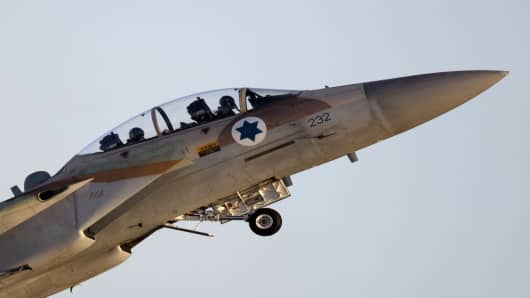Earlier this month, a report by Reuters on the state of Israeli air defenses flew under the radar.
The story noted that an F-16 on a training mission crashed into the Mediterranean due to apparent engine failure.
The jet is made by Lockheed Martin and the engines by Pratt and Whitney, a division of United Technologies. Both Reuters and Agence France-Presse said the head of Israel's air force then grounded all F-15s and F-16s pending further review.
The IAF's own website said its commander "ordered a moratorium on any further training sessions of the F-15I and F-16I Formations until all details clear up."
Those aircraft make up nearly the entirety of Israel's fighter jet force.
Grounding all of the planes—whether completely or for training - would seemingly leave the Jewish State without appropriate air cover at a time when Egypt and Syria are especially unstable and Iran remains a threat (though Israel has many other weapons in its arsenal).
Meantime, the U.S. has said it will sell Israel some V-22 Ospreys, made by Textron's Bell Helicopter, which could potentially be used in an attack on Iran.
The country will also be the first international customer for Lockheed's F-35, which won't go into service until sometime after 2018.
Long term, a military source told the Associated Press that Israel wants to have a combat air force comprised almost entirely of unmanned aircraft, but that is decades away.
Those future programs don't address the current situation. The IAF has provided no further update on the state of its fighter force, and it turns out Israel may have more to worry about than Egypt, Syria, and Iran.
In a provocative report, IHS Jane's Intelligence Review claims analysis of images in Saudi Arabia indicate "a hitherto undisclosed surface-to-surface missile base deep in the Saudi desert...with the launch pads pointing in the directions of Israel and Iran." IHS Jane's analysts believe the base is—or will be- stocked with Chinese-made intermediate range ballistic missiles.
The Saudis have been one of America's biggest defense customers, buying 84 Boeing-made F-15s in 2010 for a record $29 billion. Now the U.S. is selling the Saudis air-to-ground missiles, presumably for those same jets. Defense Secretary Chuck Hagel announced that latest sale at the same time he announced the Osprey sale to Israel.
Could Saudi Arabia be buying American missiles, and at the same time preparing to aim Chinese missiles at one of America's staunchest allies? Is Saudi Arabia protecting itself from what it perceives as a threat?
"We cannot be certain that the missiles are pointed specifically at Tel Aviv and Tehran themselves, but if they were to be launched, you would expect them to be targeting major cities," said the IHS Jane's report. "We do not want to make too many inferences about the Saudi strategy, but clearly Saudi Arabia does not enjoy good relations with either Iran or Israel."
- CNBC's John Torrisi contributed to this report.



